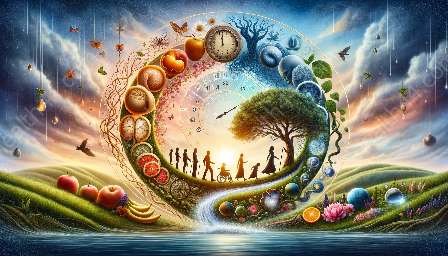As individuals age, the endocrine system undergoes significant changes, leading to alterations in the levels and functioning of reproductive hormones. This process can have profound effects on reproductive health, impacting fertility, sexual function, and overall well-being. Understanding the interplay between aging and reproductive hormones is crucial for maintaining reproductive health as we grow older.
Reproductive Hormones and Aging
Reproductive hormones play a pivotal role in the development and functioning of the reproductive system throughout life. However, as individuals age, the production and regulation of these hormones undergo changes that can affect various aspects of reproductive health.
Estrogen
One of the key reproductive hormones, estrogen, experiences fluctuations as individuals age, particularly in women. During menopause, the ovaries gradually decrease their production of estrogen, leading to a range of physical and physiological changes. These changes can include alterations in menstruation patterns, vaginal dryness, and decreased bone density, among others.
Progesterone
Similarly, progesterone, another important hormone in the female reproductive system, can decline with age. This decline can impact the menstrual cycle and may influence fertility in women.
Testosterone
In men, testosterone levels also experience changes with age. Testosterone production tends to decline gradually, leading to potential effects on sexual function, energy levels, and muscle mass.
Impact on Reproductive Health
The age-related changes in reproductive hormones can have far-reaching implications for reproductive health and overall well-being. Understanding these implications is essential for effectively managing and maintaining reproductive health as we age.
Fertility
Age-related changes in reproductive hormones can significantly impact fertility. In women, declines in estrogen and progesterone levels can affect the regularity of ovulation and reduce the chances of conception. Similarly, decreased testosterone levels in men can also influence fertility by affecting sperm production and quality.
Sexual Function
Reproductive hormone fluctuations can affect sexual function and libido. Changes in estrogen and testosterone levels can lead to decreased sex drive, vaginal dryness, and erectile dysfunction, which can impact sexual satisfaction and overall relationship dynamics.
Bone Health
Estrogen plays a critical role in maintaining bone density, and its decline during menopause can lead to an increased risk of osteoporosis and bone fractures in women. This highlights the close relationship between reproductive hormones and overall bone health as individuals age.
Maintaining Reproductive Health
Given the impact of age-related changes in reproductive hormones on reproductive health, it is vital to adopt strategies that support healthy hormonal balance and overall well-being as we age.
Healthy Lifestyle Choices
Engaging in regular physical activity, maintaining a balanced diet, and managing stress can help support hormonal balance and promote reproductive health. Additionally, avoiding smoking and excessive alcohol consumption can positively impact reproductive hormone levels.
Medical Interventions
For individuals experiencing significant disruptions in reproductive hormones, medical interventions such as hormone replacement therapy (HRT) may be considered. HRT can help alleviate symptoms associated with hormonal imbalances and support reproductive health.
Regular Health Monitoring
Regular check-ups with healthcare providers, including assessments of reproductive hormone levels, are essential for monitoring and addressing any potential imbalances or issues related to reproductive health. Open communication with healthcare professionals can facilitate personalized interventions and support for maintaining reproductive health.
Conclusion
Age-related changes in reproductive hormones have complex and multifaceted effects on reproductive health. Understanding the interplay between aging and reproductive hormones and implementing strategies to support healthy hormonal balance are critical for maintaining reproductive health as we age. By prioritizing reproductive health and seeking appropriate support and interventions, individuals can navigate the challenges and opportunities associated with aging while preserving their reproductive well-being.


